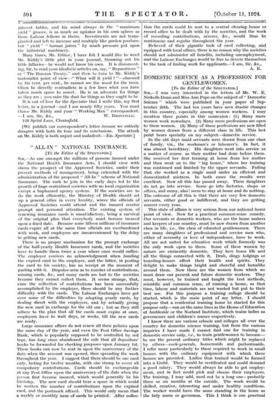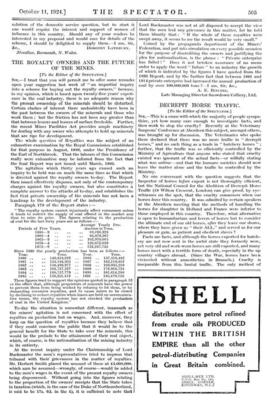DOMESTIC SERVICE AS A PROFESSION FOR GENTLEWOMEN.
[To the Editor of the SPECTATOR.] SIR,—I was very interested in the letters of Mr. W. -E. Nickolls Dunn and Miss Ann Pope on the subject of" Domestic Science" which were published in your paper of Sep- tember 20th. The last ten years have seen drastic changes in this, country, especially among women workers. I may mention three points in this connexion : (1) Many more women work nowadays. (2) Many more professions are open to these women.. (3) Many of these professions are now filled by women drawn from a different class in life. This last point bears specially on my subject—domestic service.
In the old days maid servants were drawn from one class of family, viz., the workman's or labourer's. In fact, it was almost hereditary. His daughters went into service as a matter of course, as their mother had done before them. She received her first ,training at home . from her mother and then went on to the "big house," .where her training was continued and finished by the upper servants. Failing that she worked as a single maid under an efficient and domesticated mistress. In both eases the results were excellent. Now all this has passed away. These daughters do not go into service. Some go into factories, shops or offices, and many, alas ! seem to stay at home and do nothing. The outcome of all this is that there are very few domestic servants, either good or indifferent, and they are getting scarcer every year.
This state of affairs is very serious from our national. home point of view. Now for a practical common-sense remedy. Our servants or domestic workers, who are the home makers and keepers of our country, must be now drawn from another class in life, i.e., the class of educated gentlewomen. There are many daughters of professional and service men who, either of necessity or love of independence, have to work. All are not suited for educative work which formerly was the only work open to them. Some of these women by nature are eminently domestic. They love home life and all the things connected with it. Drab, dingy lodgings or boarding-houses affect their health and spirits. They delight to make things bright and cheerful and homelike around them. Now these are the women from which we must draw our present and future domestic workers. They must, however, be trained and taught the best methods, scientific and common sense, of running a house, so that time, labour and materials are not wasted but put to their best use. For this purpose a training college should be started, which is the main point of my. letter. I should propose that a residential training home be started for this purpose only—run on the same lines as the House of Education at Ambleside or the Norland Institute, which trains ladies as governesses and children's nurses respectively.
I know there are various schools and colleges all over the country for domestic science training, but from the various inquiries I have made I cannot find one for training in domestic service only, i.e., to train gentlewomen to become— to use the present ordinary titles which might be replaced by others—cook-generals, housemaids and parlourmaids. I refer more particularly to those required to work in small houses with the ordinary equipment with which these houses are provided. Ladies thus trained would be formed into a Guild. They would be certificated and could demand a good salary. They would always be able to get employ- ment, and in fact could pick and choose their employers. The training, I may add, need not be a long one—probably three or six months at the outside. The work would be skilled, creative, interesting and under healthy conditions. The worker would have the same standing in the home as the lady nurse or governess. This I think is one practical
solution of the domestic service question, but to start it one would require the interest and support of women of influence in this country. Should any of your readers be interested in my proposal and would care for details of the scheme, I should be delighted to supply them.—I am, Sir,
DOROTHY LATHBURY.
MaesIlan, Bar-mouth, N. Wales.











































 Previous page
Previous page